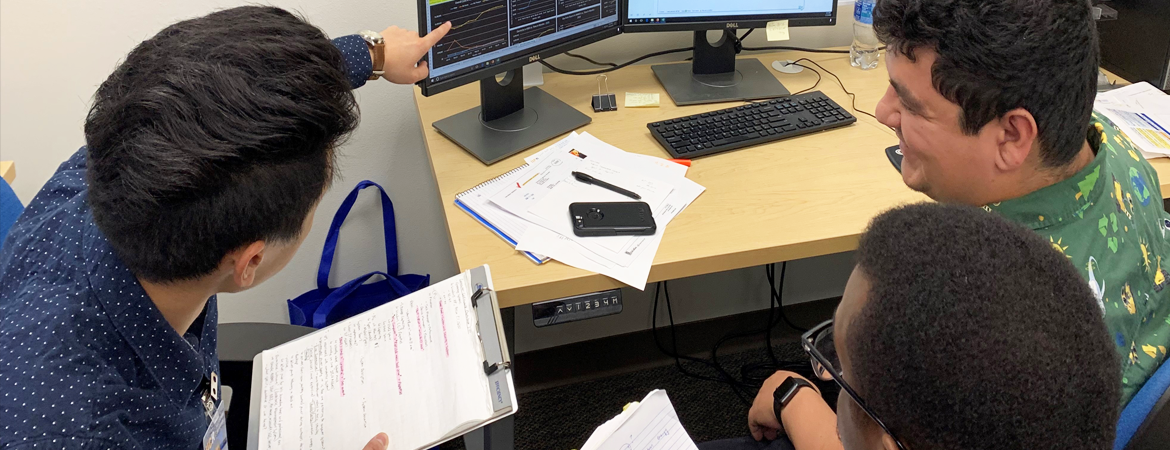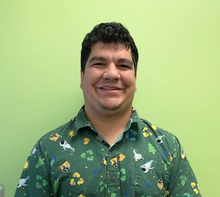
In May 2019, Facilities Services (FS) welcomed Alejandro Gonzalez, Brandon Moffett, and Leo Ngo to the Energy team to assist Energy Manager, David Palacios and Energy Engineer, Chad Sisco with various energy and utility applications such as energy efficiency and savings, utility infrastructure, smart-metering and sustainability initiatives.
Since the start of the program, the interns have become committed to improving the FS campus lighting projects, tracking campus utilities, and assisting with documenting metered buildings on campus. Providing expertise from both the Electrical Engineering and Mechanical Engineering fields, the close-knit team is dedicated to their projects and collaborate to develop creative solutions for the university.
Learn more about our Energy Interns and their projects below!
Alejandro Gonzalez
Mechanical Engineering Major
Fourth Year
My name is Alejandro Gonzalez and I am a fourth year mechanical engineer. I will be graduating in the spring of 2020 and have enjoyed my classes which focus on design and manufacturing the most. Working here at FS has really opened my eyes into how important all branches of engineering are in developing smart and energy efficient infrastructure. I hope I can apply the knowledge I have developed in those classes and the skills I have developed as a UCR Energy Management Engineer to one day become a Disney Imagineer. I want to be one of the many Disney Imagineers that help create the magical attractions in the theme parks around the world.
My Projects
Utility Billing Spreadsheet - The energy team has collected utility bills from 2015 - 2019 and compiled all of the data in Excel in order to show trends based on usage and cost for each utility. This document is continually updated with each passing month and is used to see how UCR can help save energy and reduce carbon dioxide emissions.
Metered Building Documentation - We have collected any documentation available concerning electrical metering for buildings on campus. When a document is found, the information is added to a running spreadsheet showing which buildings have an electrical meter and which document can be referenced to prove that. The next step for this project is to go and verify the meters in field.
NFPA 70E - Arc Flash - Our team created a summary explaining how arc flashes can occur when electrical equipment is being worked on. Arc flashes are a safety concern for all of UCR's electrical technicians and in order to keep them as protected as possible, inventory of their arc flash resistant gear was taken and is the process of being updated and replaced.
LED Phase 2 - Lighting Audit - The energy team walked through 17 buildings counting different types of light fixtures and recording the total power consumption per fixture. This data was then used to predict how much money would be saved annually if all the lights were converted into LED's. The calculations also included the annual reduction of carbon emissions and the total annual power that would be saved.
Multidisciplinary Research Building - Monthly Power Usage - The Multidisciplinary Research Building (MRB) has an electrical Sharkmeter recording data about the buildings power usage. Every month, the energy team extracts data from this meter and calculates the buildings total cost based on electrical demand and power consumption. Coordinates with the Electrical shop to field program Shark Meters.
Solar Panel Data Observation - Data is sent to the energy team concerning the campus' 3 solar panel locations every month. This data includes the power generated and the monthly cost for the solar panels. The energy team records this data and notes the anomalies they may have occurred in the 30-day period.
Brandon Moffett, EIT
Mechanical Engineering Major with concentration in Design and Manufacturing
Fourth Year
I am a senior at UCR majoring in mechanical engineering with a concentration in design and manufacturing. My expected graduation date is January 2021 and look forward to completing a masters in computer science while obtaining my professional engineering license in mechanical engineering.
I am originally from Mississippi and my hobbies include creating personal programs, participating in IEEE micro mouse competitions, developing personal projects with Arduino and Raspberry Pi, and walking my cat. My ultimate passion is to be able to integrate programming with mechanical control systems, robotics, automation and simulation.
My Projects
LED Phase 2 - Lighting Audit - Our team performed a LED audit on 17 buildings, encompassing over 1 million gross square footage, which will result in an annual energy savings of over 2 million kWh, annual cost savings of over $200,000, and a CO2 Greenhouse reduction of 1000 Mtons per year.
Energy Efficiency Rebates - I directly managed an Energy Efficiency Rebate for more upgraded energy equipment that resulted in a rebate amount of over $8,000.
Data Analysis - The energy team performs data analysis of daily natural gas usage by creating a python program to visualize/organize specific data gathered from over 1800 stored Excel sheets, which introduced new data which entailed usage ratios, boiler efficiencies, usage trends, and more precise usage predictions.
SQL Queries - Performed SQL queries to assess and analyze large data sets of power and energy usage resulting in more effective modeling.
Wholesale Energy Natural Gas Market Analysis - Performs analysis and research on the Southern California natural gas market by looking into natural gas daily index pricing, weekly reports, associated volatility, historical energy use, weather patterns, storage capacities and SoCal natural gas pipeline maintenance. Works with Business Operations, provides recommendations and coordinates with utilities to mitigate excess charges on monthly natural gas billing.
Leo Ngo,
Electrical Engineering Major
Fourth Year
My name is Leo Ngo and I am a senior Electrical Engineering major at the Bourns College of Engineering. My concentration is in power engineering and I am expected to graduate in June 2020.
Given that there were so many fields that electrical engineering could encompass, I felt as though power engineering was the most challenging and that it was a discipline that I had to eventually master. Working as an energy engineering intern for UCR's Energy & Utility Management team, the industry has shed some light on the type of culture I look forward to pursuing after graduation. I hope to one day aid in the development of a successful, industrial-sized project in design, to deliver energy efficiency and long-term sustainability. In the near future, I will further develop my professional career by obtaining my engineer in training certification and ultimately, become a licensed professional engineer.
My Projects
Computer Software Database Audit List - I am recording specifications of current software and hardware that monitor the central plant and building management systems.
Electrical Metering Topology - I designed an Electrical Metering Topology CAD submittal for the Student Success Center in preparation for construction.
Shark Meters - Our team mapped out Shark Meters on a 12kV single line diagram to determine location, network connection, and condition specifications. Coordinates with Electrical shop to field program and extract information from Shark Meters.
On-Campus Building Nomenclature - I determined nomenclature abbreviations for the on-campus building list to easily reference.
LED Phase 2 - Lighting Audit - The energy team calculated energy efficiency of buildings with the use of light audits and field verification of kilowatt-hour energy values and obtained use and billing information for water meter measurements.
Virtual Private Network (VPN) - I established access to VPN to obtain metering measurements from existing database.
Review of Schematics - Assists in review of electrical plans and drawings for upcoming projects and renovations. Provides recommendations for metering locations.


